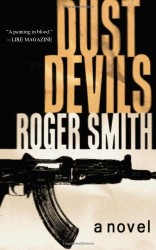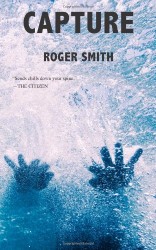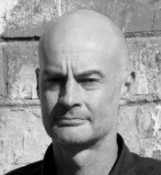News From South Africa by Joanne Hichens
Roger Smith is the best-selling South African author of MIXED BLOOD, WAKE UP DEAD, DUST DEVILS, CAPTURE, and SACRIFICES. His thrillers are published in seven languages and two are in development as movies. He recently agreed to answer a few questions for THE BIG THRILL.
Two of your books, DUST DEVILS and CAPTURE, have just been published in print in the U.S. for the first time.
Yes, I’m very pleased by this, because I have quite an enthusiastic following in the States. The books have been published in print and digitally in UK, Germany, France, Spain, and Czech Rep, but were only available digitally in the U.S. until New Pulp Press—a very exciting independent publisher that specializes in dark, transgressive crime fiction—brought them out in print in February.
Your novels are page-turners, but more than that, they’re character driven. You place people in conflict, you wait for the clash, you tighten the screws and the drama deepens…. Is this intimacy something you’re consciously trying to achieve?
Yes. I don’t write conventional mysteries or police procedurals where outsiders are brought in to solve a crime and restore moral order, I write tragedies. I want to take the reader deep into the world—into the minds, under the skins—of the protagonists and antagonists and, increasingly in my books, the distinction between the two is blurred. There are no good guys. There are no “easy” characters for the reader to cruise along with. I would hope that reading one of my books is an emotional, visceral experience, rather than an intellectual one.
Generally, why such intimate violence? Your novels are an indirect social comment, but it is the intimacy of the stories which utterly compels…
Kurt Vonnegut famously said “be a sadist.” In other words, make your characters suffer, and that’s what I do. I take flawed human beings and put them through hell. Plot is vital, and I love writing fast-moving, complex thrillers, but more and more I’m submerging myself in the worlds of increasingly dark and messed up people, and I’ve grown to trust that my readers will follow me there.
Is this also a reflection of your personality as a writer? The dark side must hold interest, and why?
I draw on a particularly South African brand of violence, almost apocalyptic in its savagery, and I’d like to believe that my books reflect it.
There is a cinematic quality to the writing, it’s very visual, visceral. Does your experience in the film industry continue to influence you? The writer is somewhat of a camera, focusing in and out. Do you use screen play writing techniques to heighten the sense of not only drama but of intimacy?
Having spent many years in the movie industry has influenced my writing, I’m sure. My screenwriting background helps with plot, structure, pace—and dialogue of course. It also encourages a certain leanness, stylistically.
I have a problem with books that tell rather than show, I tend to ditch them in frustration after a couple of pages. By framing a character with an imaginary lens I’m encouraged as a writer to let the actions of the character, the nuances, the setting and atmosphere, build a kind of written montage that propels the reader along.
Tell us about DUST DEVILS
With DUST DEVILS I set out to write a bloody, amped-up page-turner, but I wanted it to be fuelled by the things that anger me about South Africa.
When apartheid ended and Nelson Mandela came to power, there was a period in South Africa where we went from being the pariah of the world, to a role-model for transformation. A giddy time. Then Mandela moved on, and the rulers of the country became ever more self-serving and corrupt, as politicians tend to do.
Apartheid is over, but a violent crime epidemic, poverty and the highest incidence of HIV/ AIDS in the world present new challenges that are left largely unaddressed. The South African constitution is glowing testament to enlightenment and individual freedom, but teenage girls are sold into slave marriages in the name of tradition and some men believe that raping virgins (often children) will cure them of AIDS.
This is the background against which DUST DEVILS is set, and what I’ve written is no love letter.
How did the initial spark ignite?
Years ago I stumbled upon an obscure web interview with an ex-CIA operative who was undercover in South Africa in the early 1960s, based at the US consulate in Durban. He claims he got wind that Nelson Mandela—on the run from the South African security police—would be in the Durban vicinity on a certain day. The CIA guy alerted the SA cops and Mandela went to prison for 27 years. True story, or so the man says. This stayed with me, and became the catalyst for my Bobby Goodbread character in DUST DEVILS.
Once you’d got the premise for your story did the rest of it tell itself fairly quickly? Were you aware of an end point?
Well, it’s always about the characters, isn’t it? The notion of some ex-CIA black ops type, now in his seventies and dying of lung cancer, was appealing to me but only in relation to his son, a forty-something journalist who had been very much of the Left during the apartheid years, but is now battling to place himself in a country that has become (to him) the graveyard of idealism. When he is framed for the murder of his wife and children, and on the run, his only ally is his oldest enemy: his father.
So I knew that I would take this journalist, Robert Dell, to the ninth circle of hell, but I didn’t have the road map charted beforehand. I like my characters to have their say and I like to be surprised as I write.
At the centre of DUST DEVILS is truly terrifying character, Inja Mazibuko: his body is ravaged by HIV and his conscience has been destroyed by the violence of the apartheid years. How real is he?
Apartheid South Africa produced a stream of monsters, ready to go out and slaughter and maim and torture in the name of god and country. Some of them will end their days in prison. Most are still running free. The anti-apartheid struggle produced its own monsters. The Inja Mazibukos are out there, and South Africa has to acknowledge paternity.
DUST DEVILS sees the return of Disaster Zondi, who first appeared in MIXED BLOOD. Why did you bring him back?
 Unconsciously, I always seem to end up creating parallel characters in my books. The ex-CIA hit man, Bobby Goodbread, and the ‘dog of the regime’ Inja Mazibuko, are very similar people. And so are the journalist, Dell, and the ex-investigator, Zondi. Both Dell and Zondi come from the struggle against apartheid, and both are at odds with a consciousness that is in the ascendancy in South Africa.
Unconsciously, I always seem to end up creating parallel characters in my books. The ex-CIA hit man, Bobby Goodbread, and the ‘dog of the regime’ Inja Mazibuko, are very similar people. And so are the journalist, Dell, and the ex-investigator, Zondi. Both Dell and Zondi come from the struggle against apartheid, and both are at odds with a consciousness that is in the ascendancy in South Africa.
There are also parallels around family. Dell has lost his wife and children in a state-sanctioned act of violence. Zondi, an increasingly alienated sex-addict, returns to the small town he grew up in on a fool’s mission to save a girl who may or may not be his daughter from being sold into marriage to Inja Mazibuko. He has to face the superstition and cultural tics that were bred into him, no matter how sophisticated and sceptical he is. This made him a fascinating character to write.
In CAPTURE, my most recent read, Nick Exley a film-maker on a sojourn in Cape Town, his novelist wife Caroline, a creative couple with a volatile relationship, are catapulted into chaos after their daughter dies. The tragic incident sets off a chain of events that seems as inevitable as dominoes falling… Vernon’s invitation—‘Let’s see how it plays out’—is in fact, extended to us, as reader.
Why choose the death of a child as the catalyst?
That wasn’t a conscious decision. I always start with an image, something vivid that comes out of someplace deep and dark and grabs me by the throat. With CAPTURE it was the image of a man sitting on the rocks on a private Cape Town beach watching a child drown in the ocean and choosing to do nothing. I couldn’t shake this picture. I didn’t know who the man was. I didn’t know who the kid was. So I had to find out. And the only way I could find out was to start writing. That’s how it is for me: I don’t write outlines, I mostly don’t know how my books will end, I let the characters jump out at me and take me with them.
Tell us more about Vernon, the ex-cop, arch-manipulator epitome of evil.
Vernon Saul grew up on the Cape Flats, the epicentre of South Africa’s child abuse and murder plague. He was abused by his father and—like so many other victims—went on to become an abuser himself. Vernon is all about power. He became a cop to exert his power over people weaker than him. When he was wounded and pensioned out of the police force and became an armed response patrolman in a plush neighborhood, he started looking for a rich man to manipulate. For him the ultimate expression of his lust for power is to pierce the protective armour of wealth and privilege.
South African society creates people like Vernon Saul in disturbing number. Maybe we need to be asking why.
Vernon was abused as a child, as was Dawn—the exotic dancer he protects who takes on a pivotal role. Why this emphasis on child abuse?
It’s common knowledge that South Africa is one of the most violent countries in the world, what’s perhaps not as well known is that on the Cape Flats—Cape Town’s sprawling mixed-race ghetto—there’s an epidemic of child abuse and child murder. Only in the last few years has this been openly acknowledged, and every hospital in the area now has a child abuse unit, but generations have been warped by this sickness.
If you are in any way conscious you can only be appalled at the epidemic of child abuse and murder in South Africa. The statistics are staggering. I suppose I wanted to write about kids who are robbed of their childhoods: whether they are the unlucky ones who are abused or killed or the so-called lucky ones who are forced to spend their formative years being ferried between gated communities and shopping malls. And I wanted to write about the parents who succeed and the parents who fail. I have been told that CAPTURE is a tough, emotionally challenging read. I take that as praise.
The cinematic aspect, the motion ‘capture’ aspect is intriguing. Tell us more about this fascination with film and in particular this animation technique.
My first job was as an animator, back in the Dark Ages when everything was still done by hand. I ended up leaving animation and working in live-action film making, but I continued to be fascinated by animation and was very curious about the influence of digital technology on the medium.
Around twelve years ago I became a partner in a production company in Cape Town that produced a mix of live-action film and digital animation, and I learned an animation software programme very similar to the one Nick Exley uses in “Capture”
What was fascinating to me was the almost “Frankenstein” nature of this new technology, how the barrier between reality and unreality was blurring. I am no longer involved in that side of the movie business, but I keep up on the latest trends, and was drawn to the notion of a grief-stricken man “building” his dead daughter in a digital environment, in a weird, almost mystical, attempt to bring her back.
You have a new book out, SACRIFICES, I’d love to know more.
For the first time I haven’t created a villain as a character, just two people at war with the darkness in themselves. Interesting to write.
It’s set in Cape Town, in the affluent suburb of Newlands and on the Cape Flats. A wealthy white couple have—as many do—assumed responsibility for the education of their mixed race live-in domestic worker’s children, a girl and a boy. The kids grow up marooned between classes and ethnicities and while the girl chooses to go to Cape Town university, the boy is drawn toward the world of drugs and gangs on the Cape Flats.
When the son of the white couple—a spoiled, golden boy—commits a terrible crime, his parents decide to frame their domestic worker’s kid. Even though they get away with the deception (this is South Africa, cops and courts are all too eager for a “win”) they open a Pandora’s box of revenge and retribution that is particularly horrifying.
What are you busy with at the moment?
I’m doing the screenplay adaptation of my first book, MIXED BLOOD, for an American production company and I’m working on a new novel which should be done later this year.
Thanks, Roger, great to catch up with you. I look forward to SACRIFICES, and your novel in the making.
DUST DEVILS and CAPTURE are available on Amazon.
*****
 Joanne Hichens is an author, editor, blogger at News24, and creative writing teacher at Rhodes University. Her novel DIVINE JUSTICE, featuring PI Rae Valentine, was named a Top Ten KillerThriller by the Sunday Times and a Top Ten LitNet Read for 2011.The sequel, SWEET PARADISE, will be out in 2014. BLOODY SATISFIED, an anthology of South African crime-thriller fiction, edited by Joanne,has just been released by Mercury.
Joanne Hichens is an author, editor, blogger at News24, and creative writing teacher at Rhodes University. Her novel DIVINE JUSTICE, featuring PI Rae Valentine, was named a Top Ten KillerThriller by the Sunday Times and a Top Ten LitNet Read for 2011.The sequel, SWEET PARADISE, will be out in 2014. BLOODY SATISFIED, an anthology of South African crime-thriller fiction, edited by Joanne,has just been released by Mercury.
To learn more about Joanne, please visit her website.
Photography credit: Dieter Losskarn
- Tell Me What You Did by Carter Wilson - January 10, 2025
- The Business Trip by Jessie Garcia - January 10, 2025
- The Bourne Vendetta by Brian Freeman - January 10, 2025


